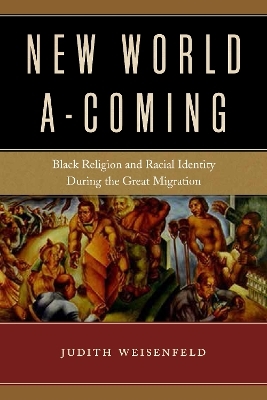
New World A-Coming
Black Religion and Racial Identity during the Great Migration
Seiten
2018
New York University Press (Verlag)
978-1-4798-6585-7 (ISBN)
New York University Press (Verlag)
978-1-4798-6585-7 (ISBN)
Winner of the 2017 Albert J. Raboteau Book Prize for the Best Book in Africana Religions
Shows how early 20th-century resistance to conventional racial categorization contributed to broader discussions in black America that still resonate today
When Joseph Nathaniel Beckles registered for the draft in the 1942, he rejected the racial categories presented to him and persuaded the registrar to cross out the check mark she had placed next to Negro and substitute “Ethiopian Hebrew.” “God did not make us Negroes,” declared religious leaders in black communities of the early twentieth-century urban North. They insisted that so-called Negroes are, in reality, Ethiopian Hebrews, Asiatic Muslims, or raceless children of God. Rejecting conventional American racial classification, many black southern migrants and immigrants from the Caribbean embraced these alternative visions of black history, racial identity, and collective future, thereby reshaping the black religious and racial landscape.
Focusing on the Moorish Science Temple, the Nation of Islam, Father Divine’s Peace Mission Movement, and a number of congregations of Ethiopian Hebrews, Judith Weisenfeld argues that the appeal of these groups lay not only in the new religious opportunities membership provided, but also in the novel ways they formulated a religio-racial identity. Arguing that members of these groups understood their religious and racial identities as divinely-ordained and inseparable, the book examines how this sense of self shaped their conceptions of their bodies, families, religious and social communities, space and place, and political sensibilities.
Weisenfeld draws on extensive archival research and incorporates a rich array of sources to highlight the experiences of average members. The book demonstrates that the efforts by members of these movements to contest conventional racial categorization contributed to broader discussions in black America about the nature of racial identity and the collective future of black people that still resonate today.
Shows how early 20th-century resistance to conventional racial categorization contributed to broader discussions in black America that still resonate today
When Joseph Nathaniel Beckles registered for the draft in the 1942, he rejected the racial categories presented to him and persuaded the registrar to cross out the check mark she had placed next to Negro and substitute “Ethiopian Hebrew.” “God did not make us Negroes,” declared religious leaders in black communities of the early twentieth-century urban North. They insisted that so-called Negroes are, in reality, Ethiopian Hebrews, Asiatic Muslims, or raceless children of God. Rejecting conventional American racial classification, many black southern migrants and immigrants from the Caribbean embraced these alternative visions of black history, racial identity, and collective future, thereby reshaping the black religious and racial landscape.
Focusing on the Moorish Science Temple, the Nation of Islam, Father Divine’s Peace Mission Movement, and a number of congregations of Ethiopian Hebrews, Judith Weisenfeld argues that the appeal of these groups lay not only in the new religious opportunities membership provided, but also in the novel ways they formulated a religio-racial identity. Arguing that members of these groups understood their religious and racial identities as divinely-ordained and inseparable, the book examines how this sense of self shaped their conceptions of their bodies, families, religious and social communities, space and place, and political sensibilities.
Weisenfeld draws on extensive archival research and incorporates a rich array of sources to highlight the experiences of average members. The book demonstrates that the efforts by members of these movements to contest conventional racial categorization contributed to broader discussions in black America about the nature of racial identity and the collective future of black people that still resonate today.
Judith Weisenfeld is the Agate Brown and George L. Collord Professor of Religion at Princeton University and the Co-Director of The Crossroads Project: Black Religious Histories, Cultures, and Communities, which is funded by the Henry Luce Foundation. She is the author of New World A-Coming: Black Religion and Racial Identity during the Great Migration, Hollywood Be Thy Name: African American Religion in American Film, 1905- 1945, and African American Women and Christian Activism: New York’s Black YWCA, 1905-1945.
| Erscheinungsdatum | 04.10.2018 |
|---|---|
| Verlagsort | New York |
| Sprache | englisch |
| Maße | 152 x 229 mm |
| Gewicht | 499 g |
| Themenwelt | Sachbuch/Ratgeber ► Geschichte / Politik ► Allgemeines / Lexika |
| Geisteswissenschaften ► Geschichte ► Regional- / Ländergeschichte | |
| Geschichte ► Teilgebiete der Geschichte ► Religionsgeschichte | |
| Geisteswissenschaften ► Psychologie | |
| Geisteswissenschaften ► Religion / Theologie | |
| Sozialwissenschaften ► Ethnologie | |
| Sozialwissenschaften ► Soziologie | |
| ISBN-10 | 1-4798-6585-0 / 1479865850 |
| ISBN-13 | 978-1-4798-6585-7 / 9781479865857 |
| Zustand | Neuware |
| Haben Sie eine Frage zum Produkt? |
Mehr entdecken
aus dem Bereich
aus dem Bereich
Herkunft, Blüte, Weg nach Osten
Buch | Hardcover (2024)
C.H.Beck (Verlag)
CHF 55,90
Von den Anfängen bis zur Gegenwart
Buch | Hardcover (2022)
C.H.Beck (Verlag)
CHF 47,60
warum die Religionen erst im Mittelalter entstanden sind
Buch | Hardcover (2024)
C.H.Beck (Verlag)
CHF 53,20


